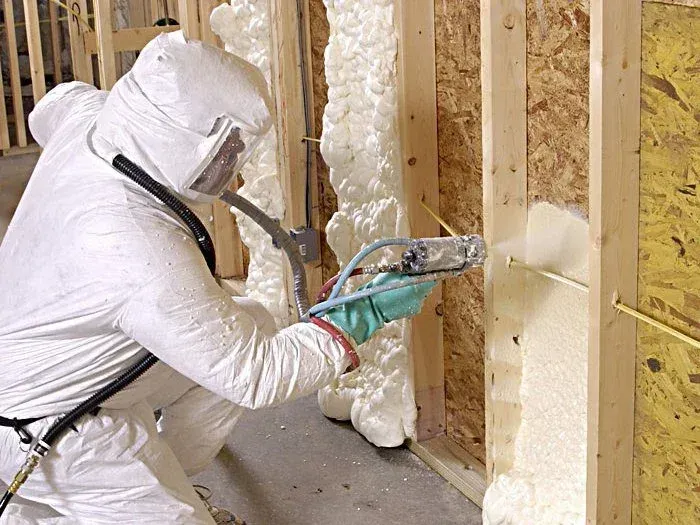Knowledge
Centre
Welcome to the Redex Knowledge Centre. Here, you'll find expert advice, insights and tools for housing disrepair and other related matters. Whether you're looking for a network of experienced surveyors or help with building related services, our knowledge centre has something for you.

The Challenges of Spray Foam Insulation: What Homeowners Need to Know
Recent reports indicate that some homeowners are experiencing difficulties when trying to remortgage or sell properties that have spray foam insulation. While this method is popular for improving energy efficiency, improper installation can lead to condensation issues that may compromise a roof's structural integrity.
What is Spray Foam Insulation?
Spray foam insulation is a liquid insulation system applied with a spray gun that expands to fill available spaces, creating a solid layer of insulation. It is commonly used in roofs, lofts, and attics and comes in two main types:
Open Cell: This type remains soft after setting and is less prone to condensation. However, it offers lower insulation density compared to closed cell foam.
Closed Cell: This type becomes rigid once set and provides superior insulation. However, as a vapor barrier, it can reduce ventilation, potentially leading to issues in roof spaces.
Spray foam insulation was included in the UK government's Green Homes Grant scheme, which subsidized up to two-thirds of the costs for energy efficiency improvements. However, concerns about its long-term effects have surfaced.
Potential Problems with Spray Foam Insulation
While spray foam has been widely used for decades, recent issues related to timber-framed roofs have come to light. If not installed correctly, spray foam insulation can:
Reduce air circulation and ventilation in roof spaces.
Cause dampness and condensation on the underside of roofs, as it acts as an air barrier that traps moisture.
Put timber-framed roofs at risk of decay.
Removing spray foam insulation can be both challenging and expensive. For instance, estimates suggest that removing foam from the roof of a three-bedroom detached house can cost around £3,200.
The Royal Institution of Chartered Surveyors (RICS) has noted that poorly installed spray foam can negatively impact a property’s valuation. Additionally, the Home Owners Alliance (HOA) has highlighted that the foam can obscure roof structures, complicating inspections for mortgage lenders.
Industry Guidance
In November 2021, the Residential Property Surveyors Association (RPSA) and the Property Care Association (PCA) released guidance regarding spray foam insulation, which was later withdrawn for a comprehensive review. They have since collaborated with lenders, surveyors, and the spray foam industry to establish better inspection protocols and installation practices.
In March 2023, the PCA introduced a new inspection protocol designed to assist surveyors in evaluating spray foam risks in pitched roofs, allowing them to assess individual roofs rather than making blanket decisions based solely on the presence of foam.
Recommendations for Homeowners
Homeowners considering spray foam insulation are advised to proceed with caution. The HOA recommends avoiding its installation until more issues are resolved. If you're determined to proceed, consider hiring a member of the National Insulation Installers.
The RICS suggests obtaining independent expertise from a qualified professional who is separate from the installer and manufacturer to determine the suitability of spray foam for your property.
Government Response
In June 2022, the government indicated that it had no plans to intervene regarding property values or mortgage access affected by spray foam insulation installed through the Green Homes Grant. They emphasized that the responsibility lies with the installer and homeowner to decide on using spray foam. Consumers who believe they have been misled may seek recourse under the Consumer Protection from Unfair Trading Regulations 2008.
Steps for Affected Homeowners
Keep Documentation: It’s essential to retain all paperwork related to your installation, including independent test certificates. This information may assist surveyors during property evaluations.
Explore Mortgage Options: Some lenders may still offer mortgages for homes with spray foam insulation, provided certain criteria are met.
Consider Professional Removal: If issues arise, consult qualified professionals to discuss the removal of spray foam insulation, as DIY removal could cause further damage.
File a Complaint: If you believe you were misled during the installation process, review the terms of your contract and raise any concerns with your installer or the relevant oversight body.
Seek Legal Advice: If necessary, consult legal resources or organizations like Citizens Advice for guidance on consumer rights and potential redress.
In conclusion, while spray foam insulation can provide energy efficiency benefits, homeowners must be aware of the potential challenges and take proactive steps to protect their investments.
Registered Office:
3rd Floor, 45 Albemarle Street | Mayfair | London | W1S 4JL
Call:
0203 910 0882
Email: [email protected]
Registered Company:
11911848

